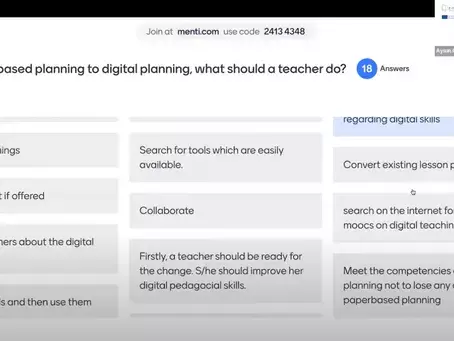
Session 4: Digital Planning and Digital Assessment & Evaluation
The fourth session of the E-Teach Workshop Series was hosted by Vrije Universiteit Brussel (VUB) on the 30th of May. This session focused on equipping educators with the knowledge and skills to effectively plan, assess, and evaluate digital learning experiences. Participants had the opportunity to explore digital planning strategies, discover innovative assessment methods, and learn about the importance of formative and summative evaluation in the digital age.
A total of 39 certificates were awarded for this session. Among these, 32 Certificates of Participation were granted to recognize the active engagement and commitment of the attendees. Additionally, 7 Certificates of Contribution were presented to acknowledge the valuable insights and contributions made by specific participants during the workshop.
Key Highlihgts:
1. Digital Planning Strategies: Participants learned about the importance of digital planning and effective strategies for planning digital learning experiences. They explored the process of aligning learning objectives with digital tools and resources, designing authentic assessments, and incorporating interactive and collaborative activities. The session emphasized the importance of pedagogical considerations and thoughtful planning to ensure meaningful learning experiences for students.
2. Innovative Assessment Methods: The session highlighted the significance of formative and summative assessment. Moreover, participants were introduced to innovative assessment methods that leverage technology in the digital age. They explored the benefits of online quizzes, interactive assignments, and digital portfolios in providing timely and formative feedback to students. Educators discussed strategies for promoting student engagement, assessing higher-order thinking skills, and ensuring fairness and validity in digital assessments.
3. Importance of Evaluation:Participants learned about the process of evaluating digital learning experiences to gain insights into their effectiveness and identify areas for improvement. They discussed the use of data and analytics to inform instructional decisions and enhance teaching practices. The session also emphasized the role of continuous evaluation and reflection in adapting digital learning experiences to meet evolving learner needs.
